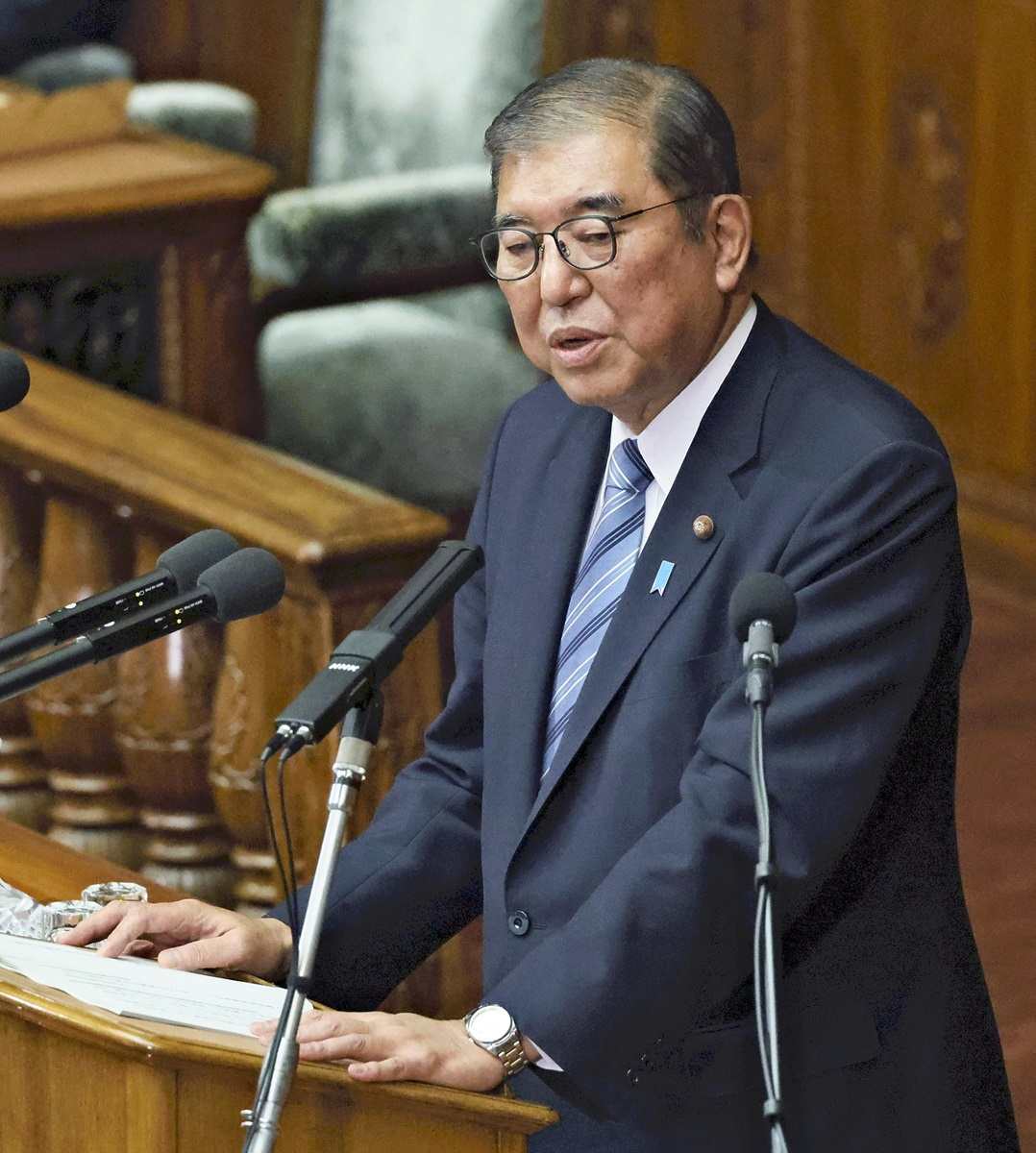Japan PM Ishiba’s Policy Speech Indicates Cautiousness toward Minority Government

Prime Minister Shigeru Ishiba delivers a policy speech at a plenary session of the House of Representatives in the Diet in Tokyo on Friday.
16:53 JST, November 30, 2024
Prime Minister Shigeru Ishiba’s policy speech on Friday was highlighted by remarks that indicated cautiousness toward his minority government.
While engaging with claims by some opposition parties, Ishiba is poised to go through the current extraordinary Diet session with a humble approach. He included in the speech his original ideas on issues such as regional revitalization and disaster management. However, there was the view among both the ruling and opposition parties that the prime minister did not sufficiently address political reform and overhaul of social security.
Quoted ex-PM Ishibashi
In the beginning of his speech, Ishiba quoted words from a policy speech by former Prime Minister Tanzan Ishibashi, pledging to “create a practice of always exchanging opinions frankly” and “spare no effort in cooperating with each other regarding matters on which we should work together.”
Through using quotes from a policy speech delivered on Feb. 4, 1957 — the day Ishiba was born — he expressed his hope for constructive discussions by the ruling and opposition parties.
Ishiba went on to say, “The ideal form of democracy is that each political party and group, which echoes various voices of the people, earnestly discusses policies to draw up better plans.” He stressed his intention to listen attentively to the opinions of other parties.
As Ishiba faces the first full-fledged Diet deliberations under the minority ruling coalition of the Liberal Democratic Party and Komeito, he believed that Ishibashi — a journalist-turned-politician who focused on the power of speech — could be a guiding light. Because the Ishibashi cabinet was short-lived, lasting only 65 days, there were objections within the government that quoting Ishibashi might be bad luck. Yet Ishiba, who demonstrates strong attachment to Ishibashi such as by having a complete collection of his writings, did not give in to objections, according to a senior government official.
Ishiba’s distinctiveness
In his policy speech, Ishiba presented his distinctiveness in the areas of regional revitalization and disaster management by referring to specific measures, such as taking advantage of short-time regular employees who work flexibly with a status of full-time employees as well as promoting the installment of air conditioning equipment in gymnasiums that are used as shelters for evacuees.
However, Ishiba faces the challenge of a weak internal party base. In the area of foreign affairs and security, he has withheld his signature ideas of creating an Asian version of the North Atlantic Treaty Organization and revising the Japan-U.S. Status of Forces Agreement in light of a cautious view within the LDP, as he did so in his policy speech in October.
In the speech, Ishiba did not give any specifics on social security reform, an issue that has split views both inside and outside the LDP. Regarding political reform, he only vowed to hold bipartisan discussions and reach a conclusion on the matter by the end of the year.
Views on noncontroversial issues
The speech was met with criticism as Ishiba mainly presented views on issues that are unlikely to raise objections.
“It’s hard to see his vision of the nation [from his speech],” one LDP executive said. “[The speech] was full of things that the Cabinet ministers in charge of respective issues could have spoken of.”
Yoshihiko Noda, president of the largest opposition party Constitutional Democratic Party of Japan, also criticized the speech, saying to reporters: “It is too shallow. I didn’t sense his ambition or resolve about political reforms.”
Yuichiro Tamaki, leader of the Democratic Party for the People seen as a key player in Ishiba’s minority government, said, “I give credit [to the prime minister] for stating a pledge to raise the threshold over the ¥1.03 million annual income barrier.”
But Tamaki added, “Unless he has the willingness to carry out the measures that must be implemented for the country’s sake, there is no way we can cooperate with him.”
Related Tags
Top Articles in Politics
-

Japan PM Takaichi’s Cabinet Resigns en Masse
-

Sanae Takaichi Elected 105th Prime Minister of Japan; Keeps All Cabinet Appointees from Previous Term
-

Japan’s Govt to Submit Road Map for Growth Strategy in March, PM Takaichi to Announce in Upcoming Policy Speech
-

LDP Wins Historic Landslide Victory
-

LDP Wins Landslide Victory, Secures Single-party Majority; Ruling Coalition with JIP Poised to Secure Over 300 seats (UPDATE 1)
JN ACCESS RANKING
-

Japan PM Takaichi’s Cabinet Resigns en Masse
-

Japan Institute to Use Domestic Commercial Optical Lattice Clock to Set Japan Standard Time
-

Israeli Ambassador to Japan Speaks about Japan’s Role in the Reconstruction of Gaza
-

Man Infected with Measles Reportedly Dined at Restaurant in Tokyo Station
-

Man Infected with Measles May Have Come in Contact with Many People in Tokyo, Went to Store, Restaurant Around When Symptoms Emerged


















